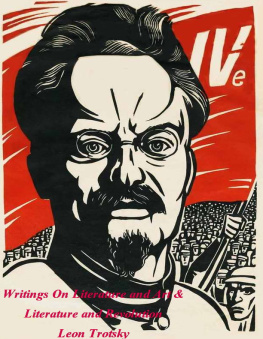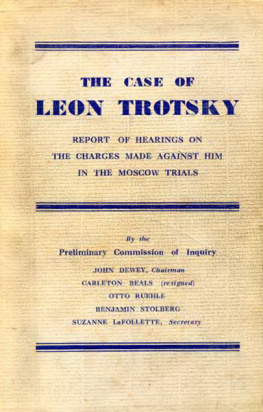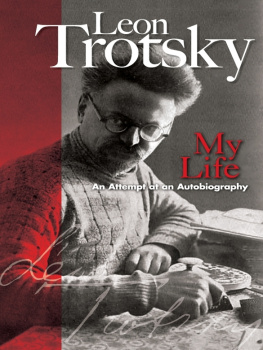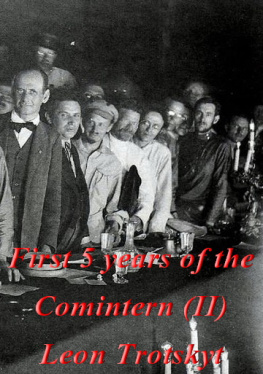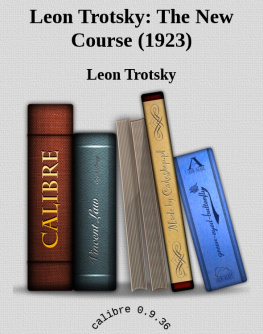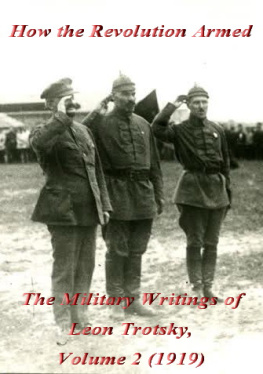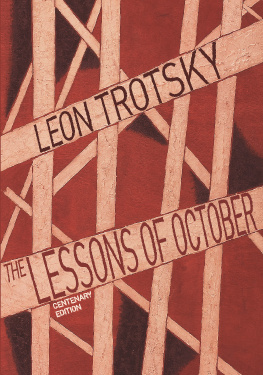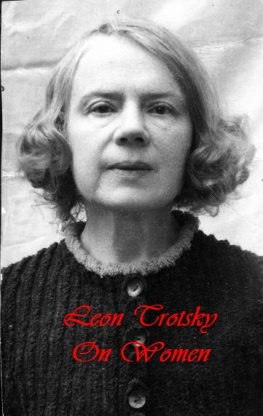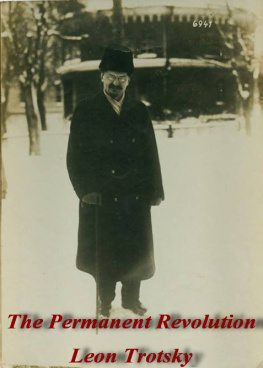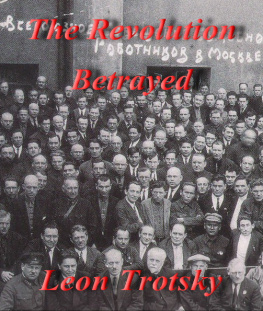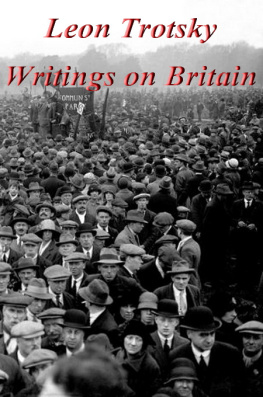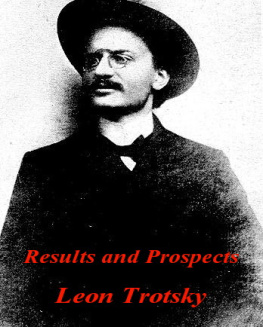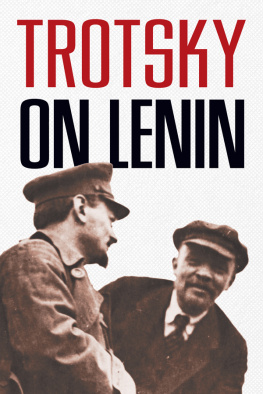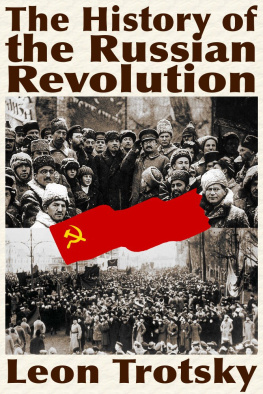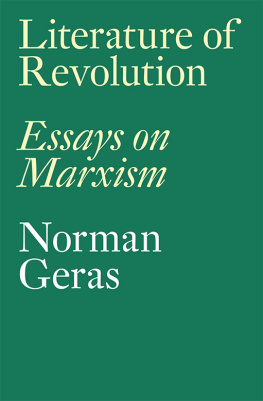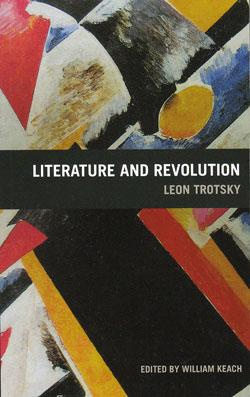Trotsky - Writings On Literature and Art & Literature and Revolution
Here you can read online Trotsky - Writings On Literature and Art & Literature and Revolution full text of the book (entire story) in english for free. Download pdf and epub, get meaning, cover and reviews about this ebook. publisher: Marxists Internet Archive, genre: Politics. Description of the work, (preface) as well as reviews are available. Best literature library LitArk.com created for fans of good reading and offers a wide selection of genres:
Romance novel
Science fiction
Adventure
Detective
Science
History
Home and family
Prose
Art
Politics
Computer
Non-fiction
Religion
Business
Children
Humor
Choose a favorite category and find really read worthwhile books. Enjoy immersion in the world of imagination, feel the emotions of the characters or learn something new for yourself, make an fascinating discovery.
Writings On Literature and Art & Literature and Revolution: summary, description and annotation
We offer to read an annotation, description, summary or preface (depends on what the author of the book "Writings On Literature and Art & Literature and Revolution" wrote himself). If you haven't found the necessary information about the book — write in the comments, we will try to find it.
Writings On Literature and Art & Literature and Revolution — read online for free the complete book (whole text) full work
Below is the text of the book, divided by pages. System saving the place of the last page read, allows you to conveniently read the book "Writings On Literature and Art & Literature and Revolution" online for free, without having to search again every time where you left off. Put a bookmark, and you can go to the page where you finished reading at any time.
Font size:
Interval:
Bookmark:
Literature and Revolution
Converted to ebook format: by Kollektiv Yakov Perelman, from the version available on line at Trotsky Internet Archive in March 2014
1923:
1923:
1923:
1924:
1923: Literature and Revolution
Transcribed for the Internet by Andy Blunden.
It is untrue that revolutionary art can be created only by workers. Just because the revolution is a working-class revolution, it releases to repeat what was said before very little working-class energy for art. During the French Revolution, the greatest works which, directly or indirectly, reflected it, were created not by French artists, but by German, English, and others. The French bourgeoisie, which was directly concerned with making the revolution, could not give up a sufficient quantity of its strength to re-create and to perpetuate its imprint. This is still more true of the proletariat, which, though it has culture in politics, has little culture in art. The intelligentsia, aside from the advantages of its qualifications in form, has also the odious privilege of holding a passive political position, which is marked by a greater or lesser degree of hostility or friendliness towards the October Revolution.
It is not surprising, then, that this contemplative intelligentsia is able to give, and does give, a better artistic reproduction of the revolution than the proletariat which has made the revolution, though the re-creations of the intelligentsia are somewhat off line. We know very well the political limitations, the instability and the unreliability of the fellow travellers. But if we should eliminate Pilnyak, with his The Naked Year, the Serapion Fraternity with Vsevolod Ivanoy, Tikhonoy, and Polonskaya, if we should eliminate Mayakovsky and Eannin, is there anything that will remain for us but a few unpaid promissory notes of a future proletarian literature? Especially as Demyan Byedny, who cannot be counted among the fellow travellers and who, we hope, cannot be related from revolutionary literature, cannot be related to proletarian literature in the sense as defined by the manifesto of the Kuznitsa. What will remain then?
Does that mean that the party, quite in opposition to its nature, occupies a purely eclectic position in the field of art? This argument, which seems so crushing, is, in reality, extremely childish. The Marxian method affords an opportunity to estimate the development of the new art, to trace all its sources, to help the most progressive tendencies by a critical illumination of the road, but it does not do more than that. Art must make its own way and by its own means. The Marxian methods are not the same as the artistic. The party leads the proletariat but not the historic processes of history. There are domains in which the party leads, directly and imperatively. There are domains in which it only cooperates. There are, finally, domains in which it only orients itself. The domain of art is not one in which the party is called upon to command. It can and must protect and help it, but it can only lead it indirectly. It can and must give the additional credit of its confidence to various art groups, which are striving sincerely to approach the revolution and so help an artistic formulation of the revolution. And at any rate, the party cannot and will not take the position of a literary circle which is struggling and merely competing with other literary circles.
The party stands guard over the historic interests of the working class in its entirety. Because it prepares consciously and step by step the ground for a new culture and therefore for a new art, it regards the literary fellow travellers not as the competitors of the writers of the working class, but as the real or potential helpers of the working class in the big work of reconstruction. The party understands the episodic character of the literary groups of a transition period and estimates them, not from the point of view of the class passports of the individual gentlemen literati, but from the point of view of the place which these groups occupy and can occupy in preparing a socialist culture. If it is not possible to determine the place of any given group today, then the party as a party will wait patiently and gracefully. Individual critics or readers may sympathise with one group or another in advance. The party, as a whole, protects the historic interests of the working class and must be more objective and wise. Its caution must be double-edged. If the party does not put its stamp of approval on the Kuznitsa, just because workers write for it, it does not, in advance, repel any given literary group, even from the intelligentsia, insofar as such a group tries to approach the revolution and tries to strengthen one of its links a link is always a weak point between the city and the village, or between the party member and the non-partisan, or between the intelligentsia and the workers.
Does not such a policy mean, however, that the party is going to have an unprotected flank on the side of art? This is a great exaggeration. The party will repel the clearly poisonous, disintegrating tendencies of art and will guide itself by its political standards. It is true, however, that it is less protected on the flank of art than on the political front. But is this not true of science also? What are the metaphysicians of a purely proletarian science going to say about the theory of relativity? Can it be reconciled with materialism, or can it not? Has this question been decided? Where and when and by whom? It is clear to anyone, even to the uninitiated, that the work of our physiologist, Pavlov, is entirely along materialist lines. But what is one to say about the psychoanalytic theory of Freud? Can it be reconciled with materialism, as, for instance, Karl Radek thinks (and I also), or is it hostile to it? The same question can be put to all the new theories of atomic structure, etc., etc. It would be fine if a scientist would come along who could grasp all these new generalisations methodologically and introduce them into the dialectic materialist conception of the world. He could thus, at the same time, test the new theories and develop the dialectic method deeper. But I am very much afraid that this work which is not like a newspaper or journalistic article, but a scientific and philosophic landmark, just as the Origin of Species and Capital will not be created either today or tomorrow, or rather, if such an epoch-making book were created today, it would risk remaining uncut until the time when the proletariat will be able to lay aside its arms.
But does not the work of culture-bearing, that is, the work of acquiring the ABC of pre-proletarian culture, presuppose criticism, selection and a class standard? Of course it does. But the standard is a political one and not an abstract cultural one. The political standard coincides with the cultural one only in the broad sense that the revolution creates conditions for a new culture. But this does not mean that such a coinciding is secured in every given case. If the revolution has the right to destroy bridges and art monuments whenever necessary, it will stop still less from laying its hand on any tendency in art which, no matter how great its achievement in form, threatens to disintegrate the revolutionary environment or to arouse the internal forces of the revolution, that is, the proletariat, the peasantry and the intelligentsia, to a hostile opposition to one another. Our standard is, clearly, political, imperative and intolerant. But for this very reason, it must define the limits of its activity clearly. For a more precise expression of my meaning, I will say: we ought to have a watchful revolutionary censorship, and a broad and flexible policy in the field of art, free from petty partisan maliciousness ...
Font size:
Interval:
Bookmark:
Similar books «Writings On Literature and Art & Literature and Revolution»
Look at similar books to Writings On Literature and Art & Literature and Revolution. We have selected literature similar in name and meaning in the hope of providing readers with more options to find new, interesting, not yet read works.
Discussion, reviews of the book Writings On Literature and Art & Literature and Revolution and just readers' own opinions. Leave your comments, write what you think about the work, its meaning or the main characters. Specify what exactly you liked and what you didn't like, and why you think so.

